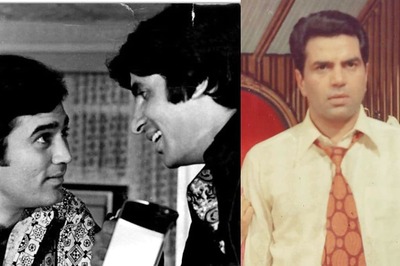
views
- Hipsters follow new trends in alternative fashion, music, and lifestyle that aren’t yet part of mainstream culture.
- Embrace hipster style by shopping at thrift stores, buying vintage clothing, and avoiding name-brand items.
- Wear graphic tees, flannel shirts, high-waisted jeans, skinny jeans, beanies, glasses, combat boots, and retro sneakers.
Hipster Style

Shop at thrift stores or small businesses. To dress like a hipster, avoid buying recognizable name labels. Instead, look for clothes at independent retailers, designers, and charity shops.

Dress vintage. Buy vintage jeans and consider a vintage floral or lace dress. Invest in some vintage denim, leather, or cargo jackets. Your grandma’s closet is a good source; but you should know how to sew and restyle vintage clothing.

Wear graphic tees. Choose band shirts such as Pink Floyd, Metallica, or Van Halen, but make sure you are actually knowledgeable about the band—you don’t want to be caught as a poser. Alternatively, find tops with appliques, images of animals or forests, other images, characters from children's TV shows, and ironic phrases or book covers. Fitted hoodies are perfect, too.

Wear flannel shirts. Channel a lumberjack vibe with plaid shirts, cowboy shirts, and anything in gingham, or checkered pattern. For a more feminine vibe (for any gender!), try paisley or vintage florals.

Wear skinny jeans. Skinny jeans especially fit the hipster style if they’re brightly colored or patterned—your style should stand out! Hipsters also like high-waisted pants or “mom jeans,” especially if they look vintage or ‘90s style.

Wear glasses. Hipsters love ironic eyewear such as shutter shades, oversized plastic framed glasses, Buddy Holly glasses, and most commonly authentic Ray Ban Wayfarers in all the colors of the rainbow. Some hipsters wear glasses even though they have 20/20 vision! In this case, pop out the lenses or make sure they're just regular glass.

Wear vintage, edgy, or unusual shoes. Go to a thrift store and look for any well-loved pair of shoes that stands out for the crowd. Classic Reebok sneakers and Doc Martens boots are popular with hipsters, although they’ve become more mainstream in recent years. High heels should be at least 5 inches (12.7 cm) in height, but ankle booties and flats are popular too. Cute sandals, Keds (tennis/sand shoes), and granny boots are also appropriate.

Accessorize with beanie hats, bright belts, and black nail polish. Wear beanie hats bird necklaces or brightly patterned tights. Permanently accessorize with plugs, piercings and tattoos. Appropriately ironic accessories are mandatory, such as things kids would take to school, like an animal image on a lunchbox. Essentials include a vintage leather messenger bag (not a backpack), preferably something from Freitag, that can fit your MacBook, iPhone, and vinyl LPs (never CDs) of your current favorite band.

Mismatch and layer. Layering or wearing things that don't match together is very hipster. Mix patterns and colors that don’t normally go together. That "I can't be bothered" look takes some planning until you get into the habit.
Hipster Lifestyle

Reuse and recycle everything you can. Use old mason jars or cleaned-out pasta sauce jars as glassware. Bring your own Tupperware or other containers to bulk food stores instead of buying products in single-use plastic. Take containers to health shops that sell bulk shampoos, detergents, and soaps. You’ll need to wrestle with the inconsistency of this step with the fact that loving shiny new Apple products and brand-new clothes from certain labels is also a side of a true hipster. But since we're all contradictory deep down, the sooner we grasp these contradictions and accept them, the more whole a person we'll be.

Surround yourself with nostalgic and retro items. Choose dated things like Parliament cigarettes, Pabst beer, your grandpa’s shirts (or shop at the thrift store for vintage finds), bicycles with fixed gears (often ridden to the night clubs), analog cameras, record players, and typewriters.

Learn to play a musical instrument. Choose an instrument that’s more obscure and less mainstream. For example, play the ukulele or the mandolin instead of the piano or guitar. Act like it's no big deal that you can play when others are amazed.

Reject blind consumerism. Hipsters are into "niche consumerism". If your purchase helps local retailers, the environment, the mom-and-pop retailer, and the craft sellers down the road, then it's hipster.

Don't define yourself to others. One of the key elements of being a hipster has been to avoid the label. Refrain from proclaiming your allegiance; to do so would be to start allying with those who like neatly tied-up boxes denoting who is what, when, and where. The moment you define yourself too clearly is when you begin to stagnate and risk being captured by the status quo. Many hipsters will deny their "hipster-ness" whenever possible. Some hipsters acknowledge and mock their own hipsterdom (for example, wearing a tee that says "I hate hipsters"). By mocking themselves first, no one else can do it.

Educate yourself. Go to college if you can—hipsters tend to pick majors like liberal arts, graphic art, or math and science. Read frequently, even if it means sitting in the local bookstore using their space and not actually purchasing the books you're siphoning up knowledge from. Go to the library (especially small, local libraries). They don't mind you just sitting reading without even taking a book out, and you can take books home for free and return them later. Education helps a hipster to be dismissive about the hue and cry of others; they know it's just history repeating itself, or it's all much ado about nothing.

Choose a career in music, art, or fashion. Hipsters are a subculture that uses more of their right brain than the rest of the society, so many hipsters pick careers related to the arts. While these areas of work aren't essential choices, they are probably a natural outlet for a hipster's creativity.

Be ahead of the trend. Hipsters sense what's worthwhile before the trend or item becomes more popular. Many bands become famous only after hipsters first flock to their unknown performances. Many clothing trends were started by hipsters, only to be hijacked later by mainstream fashion houses. Many technical gadgets are taken up by hipsters first, only to become mainstream goodies later. The irony of being a hipster is that once the trend becomes mainstream, you must move on to something obscure and unrecognized. That's the trouble with being such an independent spirit; you trailblaze, but you must keep moving on. If you're really good at something like math, medicine, psychology, political analysis, eco-awareness, etc., you might find yourself making amazing discoveries that are light years ahead of everyone else's thinking. Rest easy knowing that others will come around to your discovery someday.

Move to a hipster city. In the USA, you'll tend to find hipsters in cities with lots of independent art galleries, movie houses, and thriving music or food scenes. Think New York City, Chicago, San Francisco, Portland, Seattle, Minneapolis, and especially the Brooklyn, N.Y. suburb of Williamsburg (known as the unofficial hipster capital of the world). Places like Glasslands and Pianos will be right up your alley. Los Angeles is also acceptable, but be careful not to get sucked into Southern California culture. For less urban USA, find any moderately large college town, like Austin, TX, or Lawrence, KS. In the UK, London is your spot; in Canada, try Montreal; in Australia, try Melbourne; and in New Zealand, try Wellington. Alternatively, find hipster hangouts where you already live, like local coffee shops, bike shops, microbreweries, or small art galleries.

Keep a pulse on the hipster community. There is a strong community aspect to hipster culture. If you want to find out about the best new bands or a great local coffee shop, stay active in the community to get good recommendations and stay ahead of the trends. When some new, obscure band is on Pitchfork (preferably before), you should know about it. Check out Brooklyn Vegan (even if you don't live there), Stereogum, Gorilla vs. Bear, and the Hype Machine as often as possible, but don't make it obvious that you check them every five seconds.

Be aware that most hipsters exist in a certain age group. Hipsters tend to be in their teens through to their 30s. This is part of today's "extended adolescent" era, consisting of existential angst, searching for purpose and inner worth, and asking the meaning of everything. This doesn't mean you can't be a hipster at an older age. But older people tend to be a) not so keen to be labeled anything, b) not in need of belonging to any sub-culture, and/or c) less angry than they used to be.
Hipster Entertainment

Read hipster classics. Your reading sources are important because what you read connects you with other hipsters, informs you about cultural issues, and keeps you knowledgeable. Subscribe to hipster magazines, such as Vice, Another Magazine, and Wallpaper. Foreign magazines are good, too. Read books and analyze poetry by people like Jack Kerouac, Allen Ginsberg, and Norman Mailer. Visit the bookstores' and local library's political science, anthropology, and sociology sections frequently. Read blogs by other hipsters. You might also be inspired enough to write your own blog frequently.

Watch hipster cinema. Watch independent and foreign films, as well as attending independent theater productions, such as shows by Ann Liv Young. Watch Wes Anderson, Alfonso Cuáron, and Yorgos Lanthimos.

Listen to newly emerging, independent music. Indie music is a big part of what being a hipster is all about. Turn to the endless and ever-renewing list of independent artists in the music scene, especially in the areas of nu-rave, minimalist techno, independent rap, nerdcore, Elephant 6, garage rock, classic rock (Beatles usually), and punk rock. Hipster artists of note include Grizzly Bear, Pink Floyd, Stray Kites, The Xx, Nirvana, La Roux, M83, Neon Neon, King Khan, Milky Chance, Alt J, Chvrches, Weezer, Football Mommy, Phoebe Bridgers, and the Shrines. Imagine Dragons and Bastille are great examples of non-hipster bands because the main part of being hipster is listening to bands that no one has ever heard of. Try Days n Daze, King Krule, Mitski, ikea graveyard, Waxahatchee, Dollar Signs, spoonboy, Not Half Bad, or Pope instead. Decipher whether or not an artist is hipster by asking if your non-hipster friends have ever heard of them. Listen to the music of other countries as well, since most mainstream songs of this decade came out of the U.S., Britain, and South Korea.
Socializing as a Hipster

Use social media. Hipsters love to use Tumblr, Instagram and WordPress. Hipsters like to take photos with their Holga or vintage cameras and make cross-processed and "dream-like" pictures. Social media can also be a great way to find new things to enjoy before they become mainstream.

Date other hipsters. The reason to "hook up" with other hipsters is that you're much more likely to connect and see eye-to-eye on a range of issues. The all-American muscle guy or sorority-style tanned blonde will not likely be your type---but don't judge a book by its cover! Note that if you are already in a relationship with someone, there is no need to end it because they are not hipster, obviously. But if you're looking for a relationship, always consider that you'll probably have a lot of intimate discussions with them, so having the same hipster ideology could be a point of shared interest.

Start dancing. If you want to spot a hipster, just turn around the next time you're at a show and see them standing in the back discussing Stella or Pabst Blue Ribbon (PBR) in a can. Sometimes, if the music and setting are right, you will witness hipsters engaging in dance movements. Hipster dancing, if done correctly, does not use so much of the hips as it does the upper body and arms. Lots of swinging your head back and forth, but only do this if you're not humiliated easily (and as a hipster, you really shouldn't care). Although you'll rarely see hipsters dancing at shows, they tend to enjoy separate dance parties where they can dance to an array of more upbeat hipster dance music.

Adopt hipster lingo and attitudes. While there will be many variations—part of the reality of hipster culture is that things change constantly—there are some things that are useful to know: Remember to use perhaps the most important hipster line: "I liked them before they were cool." Talk about the obscure bands you like that nobody else has heard of. When your friends talk about a band you're unfamiliar with, just say you've heard of them but not actually heard them. Look them up the next time you have a chance. It'll give you more credit. Insult a lot of bands. If you love everything, you'll seem like a fanatic. Make sure to give off a vibe that you're too cool and elite for many bands. If you would like to seem more educated and elite, the key phrase is: "I liked their first EP, but pretty much after that, I never got into them." Use made-up words as often as possible. Or use real words that no one really knows the meaning of unless they look them up (for example, pulchritudinous, cordiform, and petrichor).

Develop a sarcastic and ironic sense of humor. When asked a question, refuse to answer directly; instead, obfuscate, ask a question in return, or just be plain sarcastic. Be sure to layer on the smirk to indicate your lack of seriousness because it's possible for the other person to mistake your sarcasm for sincerity. For example, when you’re in a movie theater and the person next to you turns to say, "Oh, my God, that was so cool! Did you see that?," dryly reply something like, "No, I paid $12.50 to stare at the ceiling." Watch British comedies for examples of good uses of sarcasm you can borrow. Unless you're already British, in which case you should be just fine.

Be prepared for criticism. Remember that hipsterism is frequently parodied or derided because hipsters bother some people. Get used to disdainful attitudes and determine how you're most comfortable responding. Given the tendency for hipsters to follow progressive politics, you'll likely encounter occasional conservative disdain. So, brushing up on your responses to any standard ridicule is a good idea. Realize that many people who attack you may have deep insecurities about their place in society.
Hipster Health

Ignore the comments about improper hygiene. Some people associate hipsters with hippies and assume that they don’t shower regularly or otherwise don’t practice proper hygiene. Though some hipsters participate in the no-shampoo movement (which is still very clean), most practice normal hygiene (with bonus artisanal and environmentally-friendly soaps!). Hipsters are less interested in professional hairstyling, spa sessions, pedicures/manicures, and large make-up kits because these are signs of conforming to cultural beauty ideals. Arguably, hipsters aren't so interested in "making the most of their assets" because they see their entire self as an asset; from a self-esteem point of view, this is actually a rather healthy outlook.

Keep your hair casual. The "slept-in" look, long, messy hair, and hair that resists any attempts to stay flat without chemicals are all acceptable. Blurring gender lines with haircuts and styles is part of the hipster culture. Greasy hair is considered okay by some in the hipster culture. For men, large beards and/or waxed mustaches are not a must but are preferred if one can grow them. Some hipsters like to dye their hair in an obvious way.

Take a green approach to food. Consider growing your own food or turning vegetarian. Use compost if possible. Eating meat isn't always popular with the hipster culture, and many hipsters tend to be vegan or vegetarian. If you have no space to grow your own produce (not even a balcony or a windowsill), go to a natural foods market instead. Often, hipsters are foodies and love making gourmet meals. If you can't cook, consider getting some beginner cookbooks.




















Comments
0 comment